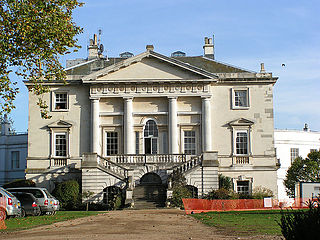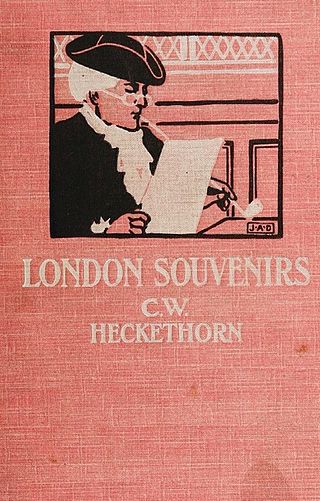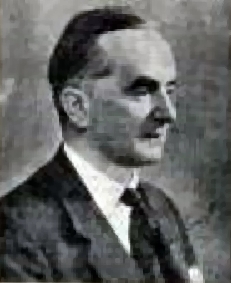
Kew is a district in the London Borough of Richmond upon Thames. Its population at the 2011 census was 11,436. Kew is the location of the Royal Botanic Gardens, now a World Heritage Site, which includes Kew Palace. Kew is also the home of important historical documents such as Domesday Book, which is held at The National Archives.

Frederick Archibald Vaughan Campbell, 3rd Earl Cawdor,, styled Viscount Emlyn from 1860 to 1898, was a British Conservative politician. He served briefly as First Lord of the Admiralty between March and December 1905.

Richmond (Yorks) was a constituency in North Yorkshire in the House of Commons of the UK Parliament. It was represented from 1910 by members of the Conservative Party. The last MP for Richmond was Rishi Sunak, the former Prime Minister and Conservative leader from 2022 to 2024.

Rt. Hon. Lord Claud John Hamilton was a British aristocrat, Member of Parliament (MP), and a noted railway director during the Victorian era.

James William Lowther, 1st Viscount Ullswater,, was a British Conservative politician. He was Speaker of the House of Commons between 1905 and 1921. He was the longest-serving Speaker of the 20th century.

Colonel Francis Charteris, nicknamed "The Rape-Master General", was a Scottish soldier and adventurer who earned a substantial sum of money through gambling and the South Sea Bubble. He was convicted of raping a servant in 1730 and sentenced to death, but was subsequently pardoned, before dying of natural causes shortly afterwards.

White Lodge is a Grade I listed Georgian house situated in Richmond Park, in the London Borough of Richmond upon Thames. Formerly a royal residence, it now houses the Royal Ballet Lower School, instructing students aged 11–16.

Sir John Knyvet was an English lawyer and administrator. He was Chief Justice of the King's Bench from 1365 to 1372, and Lord Chancellor of England from 1372 to 1377.

Brian Duppa was an English bishop, chaplain to the royal family, Royalist and adviser to Charles I of England.

The National Registration Act 1939 was an Act of Parliament in the United Kingdom. The initial National Registration Bill was introduced to Parliament as an emergency measure at the start of the Second World War.
Philip Alexander Bruce was an American historian who specialized in the history of the Commonwealth of Virginia. Author of over a dozen volumes of history, Bruce's scope ranged from the first Virginia settlements to the early 20th century. He is known for writing the first complete history of the University of Virginia, descriptions of the lives of the original settlers of Virginia, and for his insights into Thomas Jefferson's wide-ranging intellect.
Margaret Webling was a British playwright, novelist and poet. Her 1927 play version of Mary Shelley's 1818 novel Frankenstein; or, The Modern Prometheus is notable for naming the creature "Frankenstein" after its creator, and for being the inspiration of the classic 1931 film directed by James Whale.

In historiography, rural history is a field of study focusing on the history of societies in rural areas. At its inception, the field was based on the economic history of agriculture. Since the 1980s it has become increasingly influenced by social history and has diverged from the economic and technological focuses of "agricultural history". It can be considered a counterpart to urban history.
James Jupp Norris Brewer was an English topographer and novelist.

Richmond Cemetery is a cemetery on Lower Grove Road in Richmond in the London Borough of Richmond upon Thames, England. It opened in 1786 on a plot of land granted by an Act of Parliament the previous year. The cemetery has been expanded several times and now occupies a 15-acre (6-hectare) site which, prior to the expansion of London, was a rural area of Surrey. It is bounded to the east by Richmond Park and to the north by East Sheen Cemetery, with which it is now contiguous and whose chapel is used for services by both cemeteries. Richmond cemetery originally contained two chapels—one Anglican and one Nonconformist—both built in the Gothic revival style, but both are now privately owned and the Nonconformist chapel today falls outside the cemetery walls after a redrawing of its boundaries.

Charles William Heckethorn was a Swiss-born, naturalized British, author best known for his history of secret societies which was produced in two editions and translated into German, and his works relating to the history of London.
Edwin Robert Courtney Brinkworth was a historian of central England and historical writer who produced three books on the history of Banbury, Oxfordshire.

Charles Kingston O'Mahony, who wrote as Charles Kingston, was an Irish journalist and author in England during the Golden Age of Detective Fiction of the 1920s and 30s. Many of his novels were set in London, including a seven-book series featuring the fictional detective Chief Inspector Wake of Scotland Yard. His work has been described as more competent than cutting-edge, but showing a clear familiarity with the criminal underworld in London.

Albert Atkin Barkas was a librarian in the Municipal Borough of Richmond (Surrey) for 30 years who established what is now the London Borough of Richmond upon Thames' Local Studies Collection.















